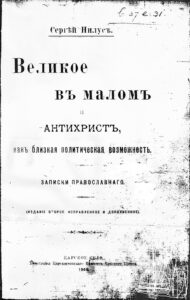FULL DOCUMENT AVAILABLE
Abstract: The document delves into the history and implications of The Protocols of the Elders of Zion, a notorious 1903 document that falsely purports to reveal a global conspiracy by Jewish leaders, known as the ‘Elders of Zion,’ to seize control of the world. However, the document’s veracity was exposed as a hoax by Philip Graves in The Times in 1921.
The document delves into the history and implications of The Protocols of the Elders of Zion, a notorious 1903 document that falsely purports to reveal a global conspiracy by Jewish leaders, known as the ‘Elders of Zion,’ to seize control of the world. However, the document’s veracity was exposed as a hoax by Philip Graves in The Times in 1921.
Despite its debunking, the myth that Jews seek world domination persists, and it forms the basis of Hamas’s ideology. Hamas believes that the Protocols accurately reflect Jewish aspirations.
The Protocols spread through various translations and played a role in Hitler’s worldview, contributing to the Holocaust as part of what he saw as the ‘final solution.’
Hamas uses the Protocols to support its belief that Jews are responsible for all wars globally. They claim that Jews influenced events like World War I, the French Revolution, and more, suggesting their involvement in various conflicts and international organizations.
Hamas sees Israel as an expansionist entity, citing The Protocols as justification. They fear that, after Palestine, Jews will seek further territorial gains.
The belief in a Greater Israel, which could encompass all the land between the Nile and the Euphrates, has some adherents in Israel, although they are a minority. The vast majority of Israelis do not aspire to such a broad territory.
Hamas views the conflict as a battle between ‘good’ (Islam) and ‘evil’ (Jewish world domination), necessitating the elimination of Jews. They believe that Muslims have a duty to take part in this struggle, framing it as a global jihad.
The article highlights the difficulty of changing entrenched mindsets, especially in the context of complex historical and political conflicts. While many in the West see the Israeli-Palestinian issue primarily as a land dispute that requires a just solution, for Hamas, it has become secondary to their anti-Semitic beliefs influenced by the Protocols.
The article concludes by addressing the challenges faced in the Israeli-Palestinian conflict, shaped by the memory of the Holocaust and Nakba, which complicates the path to peace. It also raises questions about Israel’s intentions and international concerns regarding the Likud administration’s goals since 2023. It notes that the conflict’s resolution is further complicated by modern weaponry and conflicts worldwide, such as Ukraine-Russia and China-Taiwan, and emphasizes the need for self-determination while navigating such complexities.
DOWNLOAD FULL DOCUMENT
Hamas and Israel and The Protocols of the Elders of Zion
